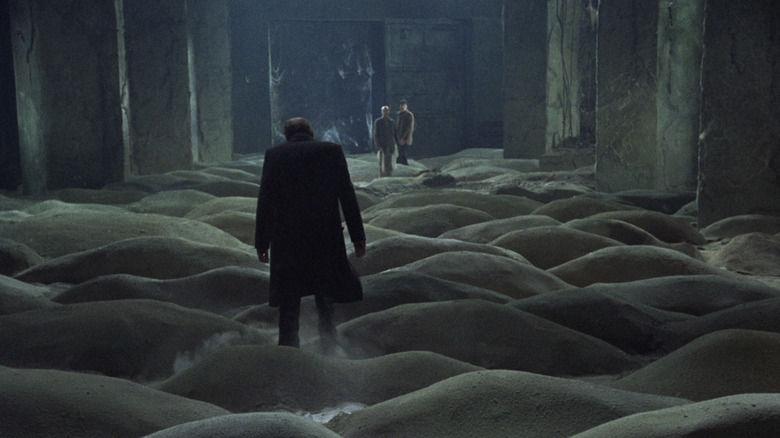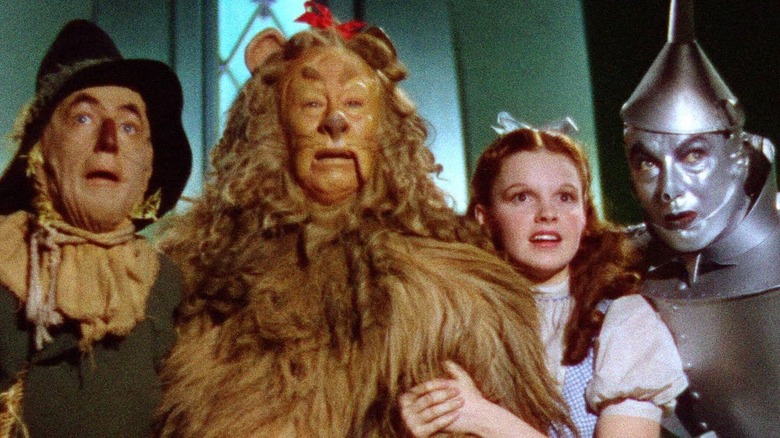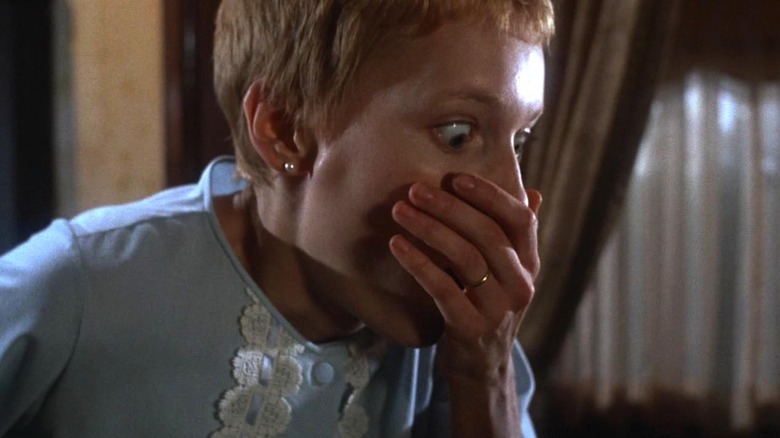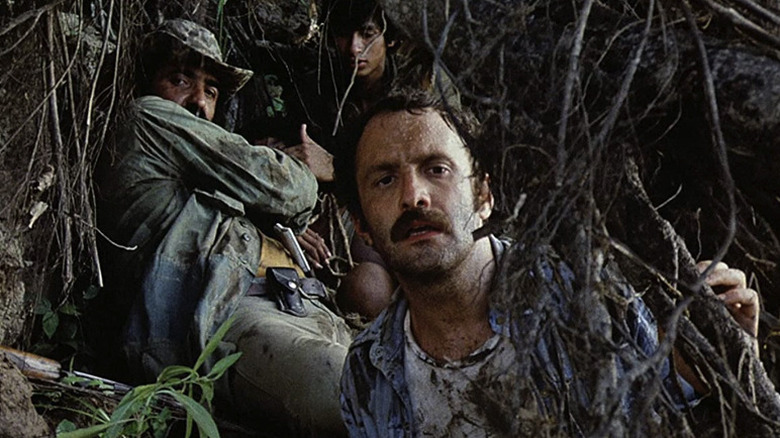Cursed Films Creator Jay Cheel On Going Outside The Box In Season 2 [Interview]
Today marks the premiere of season 2 of Shudder's streaming docuseries "Cursed Films," which delves into the urban myths and legacies of movies that are supposedly haunted or bedeviled in some fashion. Far more than just a fact versus fiction investigation, each episode of "Cursed Films" provides useful historical and societal context for the motion pictures it explores. "Cursed Films" season 2 will include looks at "The Wizard of Oz," "Rosemary's Baby," "The Serpent and the Rainbow," Andrei Tarkovsky's masterpiece "Stalker," and the notorious "Cannibal Holocaust."
Series creator (and co-host of the Film Junk podcast) Jay Cheel joined us over Zoom for a conversation about the new season.
"This season is interesting because we do have two films that are outside of the box a little bit"
First off, what gave you the impetus to start this show? Hollywood has a storied legacy of grisly stories both rumored and proven. I recall first learning about the serial killer cameo in "The Exorcist" from an episode of "Forensic Files," which you also documented in season 1 of "Cursed Films."
Well, it was kind of brought to me by Shudder to have the opportunity to pitch to them what my take on this subject would be. At the time, a friend of mine, Owen Shiflett, was with Shudder and he thought I would be a good fit because I had just done a short film called "Twisted," which was about a local drive-in that was hit by a tornado, and the story is that it was hit by a tornado while the movie "Twister" was playing. It turned into this kind of urban legend locally. It felt like that was kind of a prototype for what we ended up doing with "Cursed Films." We try to avoid the "E! True Hollywood Stories," "Forensic Files" approach ... make it more about the people that we're interviewing, especially this season. It's about their experiences and how their experiences have changed them.
In the first season, definitely we were interested in why people believe in curses to begin with. I've always thought the "cursed" element was always the jumping off point to explore these other stories, meet these people, and hear these perspectives that we might not otherwise get to hear. The show is called "Cursed Films," but the show doesn't claim that these films were cursed. The show isn't setting out to debunk anything, it's just the fact that people believe, for whatever reason, that these productions felt cursed.
What was your criteria for selecting these specific films for season 2?
This season is interesting because we do have two films that are outside of the box a little bit. Many people wouldn't say "The Wizard of Oz" is a horror film. I would say it's horror-adjacent, at the very least. The Wicked Witch of the West is, I think for a lot of people, the first experience they've had being horrified by a film ... and the flying monkeys. So I think that kind of qualifies it in my eyes. And when I say "qualifies," I am the least interested in having to [explain] why we're having to qualify setting out to tell a good story just because of the title of the show. It's really about if there's a good story there and if there's access to interesting people that we can talk to and the overall cultural interest, whether it's in cinema or just socially. The consideration was really just [what are] the best stories.
And "Stalker" is the other film that's kind of an outlier, which is a Russian art house film with science fiction elements. That's one of my favorite episodes and while the film itself isn't directly a horror film, I think some of the stories connected to the making of the film and everything that happened afterwards are in that sort of dark, mystical zone that is in line with the show. Within a season, you don't want film after film that's dealing with the same subject matter. You don't want five films that are dealing with haunted houses or something. I think it's good to break it up.
How hard is it to track down your interview subjects? You've featured everyone from descendants of movie star royalty to Satanists and Manson Family survivors. Is there ever any pushback from their representatives, or are you allowed to speak to that?
I think this season was easier than the last season because when you're going out there asking people to talk about these experiences and they see that the title of the show is "Cursed Films," they might think that this is something in line with an "E! True Hollywood Stories." But now that we have a season under our belt and we can show them what the intent is and how we approach these subjects, I think it gives them a little more confidence and more trust in our process.
If anything, the difficult part was the pandemic. That was the barrier of entry. There's a couple people that we were hoping to interview that we just couldn't get to because they were not comfortable with having a small film crew in their home or even in their backyard. That was probably the biggest challenge, but otherwise people were very happy to take part.
"I was kind of going into it feeling like I wanted it to be a little bit like a Martin Scorsese film"
The reenactment footage in "Cursed Films" is remarkably cinematic in its own right. Talk me through your process on those. It's a huge step up from, say, "Unsolved Mysteries" or any true crime cable TV show.
It's tough to present recreation footage without falling into the trap of out of focus faces and the usual sort of way that recreation is sometimes used as B-roll or filler, because they don't have anything else to cut to. The hope was that we were presenting some images that were worth capturing as a recreation. It wasn't just like, "We need space to fill, so let's cut to a shot of a desk with a cigarette burning and someone out of focus in the background." [laughs] In the first season, I think we actually have a shot like that, but it was more just, some of these stories had such strong images that people would talk about. Like Victor Fleming slapping Judy Garland [on the set of "The Wizard of Oz"], and we just had to lean into that and have some fun with that and the episodes dictated how far we went with that as well.
The "Rosemary's Baby" episode is very kinetic and pop-y. It's very much self-aware of it being a documentary about a movie about a time — I was kind of going into it feeling like I wanted it to be a little bit like a Martin Scorsese film. Quick cutting, camera flashes, and so we had some fun with that as well with some bullet hits and some "Three Kings"-inspired internal organ shots.
Has there ever been a film that you wanted to document on the show but couldn't come up with enough evidence or a compelling enough angle?
We usually have a long list that we narrow down to the films that we choose. Sometimes there are films on there where it's not necessarily that there's not enough of a story, but maybe there's just one strong element but that's it. Like there's the story of the unproduced script "Atuk," which was supposed to be this comedy about an Inuit person coming to New York. It was never produced but it has all of these weird connections to the deaths of people who were cast to play the lead character. I thought that was an interesting one because it's a script that is at the center of this, not a film. So it's kind of different, but you then have to think, well, "What else is there to that? We can't just say there was a script and these people died and that's it."
[With] some of them it feels like there's just one really strong element and not enough to support that strong element. Otherwise, this season, the "Stalker" episode, we actually filmed some interviews in 2018 because it was originally intended to be in the first season and it was cut. I'm glad to be returning to that one, that was kind of the one that felt like it was left behind and kind of simmering this whole time. To get to return to it and finish it off has been great.
"I guess I would say I'm somewhat agnostic on the idea of curses and the supernatural"
Do you have a personal belief in the supernatural?
Not really, no. I would say after doing the first season, I think I'm at least more open to the idea of things that can't be explained. I think it can be kind of annoying when everything is explained away by coincidence through a skeptical mind to a fault, where there's no consideration for the unknown. And I appreciate that, like the idea that something can remain as unexplained and we might not know the answer to it but it doesn't necessarily mean that the answer is that it's not something otherworldly. I guess I would say I'm somewhat agnostic on the idea of curses and the supernatural. In terms of curses, I believe that they are real in that someone can believe they are cursed, and allow themselves to be overcome by that concept, and that can affect the way in which they go through their lives. In that way it's real.
You mentioned a long list of movies in contention for "Cursed Films." Have you ever considered an episode about "Eyes Wide Shut?" I've read some crazy blind items about that film.
It hasn't been on there [laughs], but I will look into it now.
"Cursed Films" will air new episodes weekly every Thursday through May 5, 2022 on Shudder.



